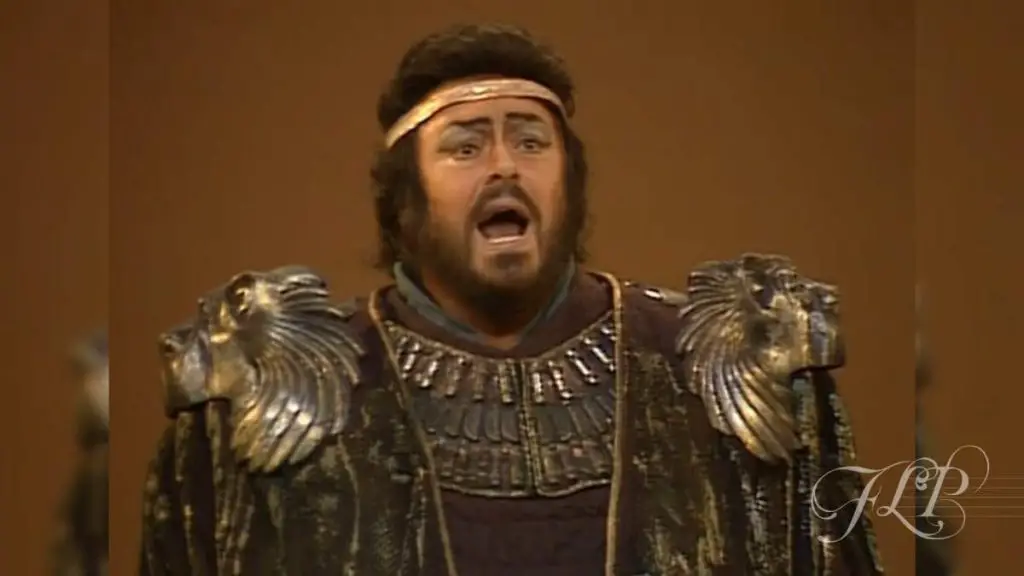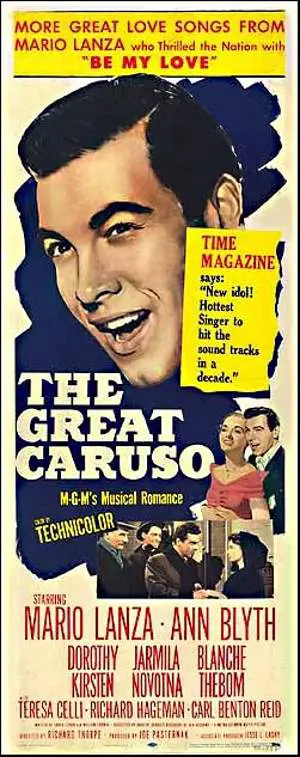American tenor and Hollywood star of Italian origin, Mario Lanza sings Celeste Aida, a romanza from the first act of the opera Aida, by Giuseppe Verdi. From The Great Caruso, the 1951 biographical film made by Metro-Goldwyn-Mayer and starring Mario Lanza as Enrico Caruso.
Celeste Aida
“Celeste Aida,” a renowned tenor aria from Giuseppe Verdi’s opera “Aida,” is celebrated for its lyrical beauty and the technical challenge it poses for performers. This piece is from the opera’s first act and serves as a showcase for the tenor’s vocal range and expressiveness.
The opera “Aida,” set in ancient Egypt, tells the story of a love triangle between Aida, an Ethiopian princess held captive in Egypt, the Egyptian military commander Radamès, and the Egyptian princess Amneris. “Celeste Aida,” sung by Radamès, opens the opera and sets the stage for the character’s internal conflict and his deep love for Aida.
In this aria, Radamès expresses his adoration for Aida, a young Egyptian warrior who wishes to be chosen as a Commander of the Egyptian army, dreaming of victory in battle, and winning her love. The lyrics speak of Aida’s beauty and Radamès’s desire to crown her with laurels and build her a throne next to the sun. The aria is both a declaration of love and a reflection of Radamès’s aspirations and hopes.
Musically, “Celeste Aida” is notable for its demanding vocal line, which requires the tenor to navigate a wide range, culminating in a high B-flat. The aria is known for its lyrical melodies, requiring both power and delicacy from the singer. The challenge lies in maintaining the aria’s gentle, dreamlike quality while delivering a technically demanding vocal performance.
The aria’s orchestration supports the vocal line with a lush, yet understated accompaniment, allowing the tenor’s voice to shine. The use of the orchestra enriches the aria’s emotional depth, highlighting the nuances of Radamès’s feelings for Aida.
“Celeste Aida” remains a favorite among tenors and opera enthusiasts for its beautiful melody and the opportunity it provides for expressive, powerful singing. It is often performed in concerts and recitals in addition to its central place in the opera itself. The aria encapsulates Verdi’s mastery in composing for the human voice and his ability to convey deep emotion through music.
The aria takes place in the hall of the King’s palace. The extended high B flat at the ends of the aria makes this one of the most challenging roles for any tenor.

Related: Pavarotti sings Celeste Aida [Verdi]
Celeste Aida lyrics (libretto)
Italian
Se quel guerrier io fossi!
Se il mio sogno si avverasse!
Un esercito di prodi da me guidato
E la vittoria e il plauso di Menfi tutta!
E a te, mia dolce Aïda,
Tornar di lauri cinto
Dirti: per te ho pugnato,
Per te ho vinto!
Celeste Aïda, forma divina,
Mistico serto di luce e fior,
Del mio pensiero tu sei regina,
Tu di mia vita sei lo splendor.
Il tuo bel cielo vorrei ridarti,
Le dolci brezze del patrio suol
Un regal serto sul crin posarti,
Ergerti un trono vicino al sol,
English translation
If only I were that warrior!
If only my dream might come true!
An army of brave men with me as their leader
And victory and the applause of all Memphis!
And to you, my sweet Aida,
To return crowned with laurels,
To tell you: for you, I have fought,
For you, I have conquered!
Heavenly Aida, divine form,
Mystical garland of light and flowers,
You are the queen of my thoughts,
You are the splendor of my life.
I want to give you back your beautiful sky,
The sweet breezes of your native land,
To place a royal garland on your hair,
To raise you a throne next to the sun.
The Great Caruso

The Great Caruso is a 1951 biographical film made by Metro-Goldwyn-Mayer, starring Mario Lanza as Enrico Caruso. It was directed by Richard Thorpe.
Mario Lanza stars in the title role as Caruso and Ann Blyth stars as his wife Dorothy; the cast also includes Carl Benton Reid, Eduard Franz, Ludwig Donath, Nestor Paiva, and Richard Hageman. It features a large number of Metropolitan Opera stars, notably sopranos Dorothy Kirsten, Teresa Celli, Lucine Amara, Marina Koshetz, and Jarmila Novotná, mezzo-soprano Blanche Thebom, baritone Giuseppe Valdengo and bass Nicola Moscona.
Sources
- Celeste Aida on Wikipedia
- The Great Caruso on Wikipedia
